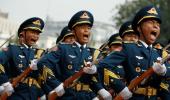 An unmanned aerial vehicle of the Indian Army crashed around Doklam in the Sikkim sector after it 'crossed' the border into China following a technical problem, prompting Beijing to lodge a diplomatic protest with India.
An unmanned aerial vehicle of the Indian Army crashed around Doklam in the Sikkim sector after it 'crossed' the border into China following a technical problem, prompting Beijing to lodge a diplomatic protest with India.
Sources in Delhi said on Thursday that the Indian security forces in Nathu La immediately informed the Chinese army over the hotline about the UAV's technical problem and crossing the Line of Actual Control.
The Indian defence ministry said its border security personnel, as per standard protocol, immediately alerted their Chinese counterparts to locate the UAV and they later reverted with its location.
It, however, did not give details of when the UAV had crashed but sources in Delhi said the incident happened around 10 days ago.
The incident comes to light days before Chinese Foreign Minister Wang Yi's visit to Delhi to attend the Russia-India-China trilateral meeting on December 11.
In Beijing, China's Defence Ministry and the Ministry of Foreign Affairs said that the Indian unmanned aerial vehicle crashed into the Chinese side of the border recently.
"Recently an Indian Unmanned Aerial Vehicle (UAV) invaded China's airspace and crashed in the Sikkim section of China-India border," Foreign Ministry spokesman Geng Shuang told a media briefing in Beijing.
He said the Chinese border troops had taken a 'professional and responsible attitude' to verify the device.
Geng did not spell out when the incident had taken place.
The Indian defence ministry said the exact cause of the incident is under investigation.
'An Indian UAV which was on a regular training mission inside the Indian territory lost contact with the ground control due to some technical problem and crossed over (to) the LAC in the Sikkim Sector,' it said in a statement released in Delhi.
It further said, 'As per standard protocol, the Indian border security personnel immediately alerted their Chinese counterparts to locate the UAV. In response, the Chinese side reverted with the location details of the UAV.'
Chinese Foreign ministry spokesman said, in an apparent reference to the 1890 China-British Treaty, said, "I want to point out that the Sikkim section of the China India border has been delimited."
Beijing often referred to the 1890 Britain-China treaty during the lengthy Dokalam standoff, stating that it has defined the Sikkim section of the boundary with Tibet, therefore the border in that area has been settled.
"The action of the Indian side violated China's sovereignty and it is not conducive to the peace and tranquillity of the border area and China is dissatisfied with this and lodged solemn representation with the Indian side," Geng said.
The armies of India and China were engaged in a 73-day-long standoff in Dokalam after Indian troops stopped Chinese soldiers from building a key road in the area.
The face-off ended on August 28. Dokalam is located in the Sikkim section of the India-China border.
In its diplomatic protest to India, "China asked the Indian side to stop the activities of the devices near the border and work with China to maintain peace and tranquillity of the border areas", Geng said.
Earlier, the Chinese military alleged that an Indian drone has 'intruded' into its airspace recently and crashed into the Chinese side of the border and voiced strong dissatisfaction over the incident.
The Indian UAV 'intruded' into China's airspace and crashed recently, and China's border troops have conducted identification and verification over the vehicle, said Zhang Shuili, deputy head of the combat bureau of the Western Theatre Command's joint staff department.
The Chinese military's western theatre command jurisdiction covers almost all of the LAC and including Tibet's border region with India and the Ladakh region.
"India's move has infringed upon China's territorial sovereignty, and we are strongly dissatisfied with and opposed to this," Zhang has been quoted by state-run Xinhua news agency as saying.
Wang's visit to Delhi will be the first visit by a top Chinese official to India after the Doklam crisis and commencement of the second five-year term for Chinese President Xi Jinping.










